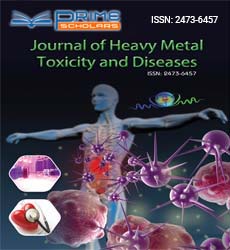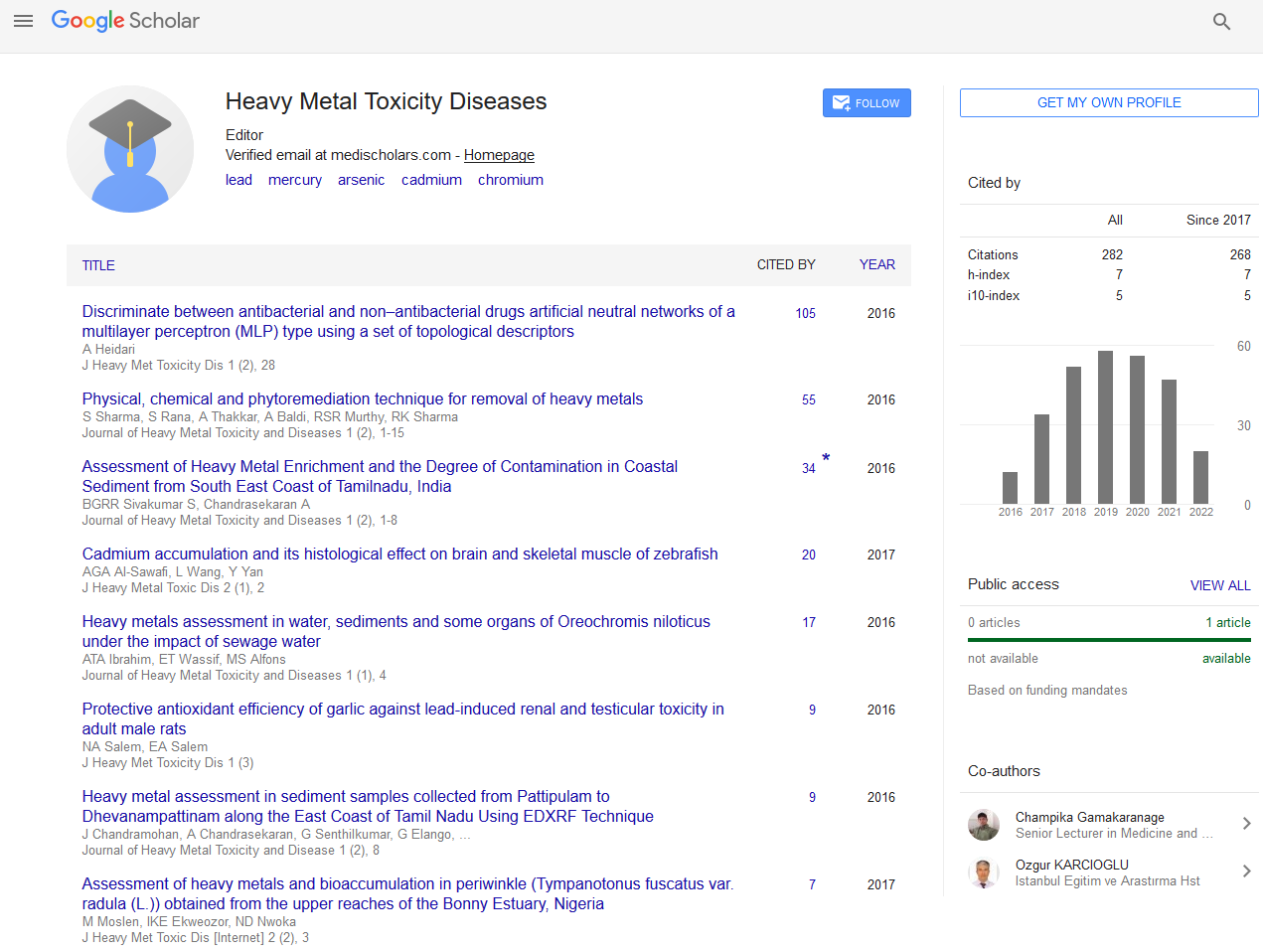Perspective - (2024) Volume 9, Issue 3
Genetic Influences on Heavy Metal Toxicity: Understanding Individual Susceptibility
Silva Ferrari*
Department of Medicine, University of Zurich, Switzerland
*Correspondence:
Silva Ferrari,
Department of Medicine, University of Zurich,
Switzerland,
Email:
Received: 29-May-2024, Manuscript No. ipjhmct-24-20633;
Editor assigned: 31-May-2024, Pre QC No. ipjhmct-24-20633 (PQ);
Reviewed: 14-Jun-2024, QC No. ipjhmct-24-20633;
Revised: 19-Jun-2024, Manuscript No. ipjhmct-24-20633 (R);
Published:
26-Jun-2024, DOI: 10.21767/2473-6457.24.3.23
Introduction
Heavy metals such as lead and mercury pose significant health
risks, with individual susceptibility influenced by genetic factors
that affect detoxification pathways. This article explores recent
studies identifying genetic variations impacting how individuals
metabolize and eliminate heavy metals, highlighting implications
for health outcomes and environmental risk management.
Description
Heavy metals are pervasive environmental pollutants known for
their toxicity to human health. The extent of health impacts from
exposure varies widely among individuals, influenced not only by
environmental factors but also by genetic differences that affect
how the body processes and eliminates these metals. Genetic
variations in genes encoding detoxification enzymes such as
glutathione S-transferases, metallothioneins, and ATP-binding
cassette transporters can significantly impact an individual’s
ability to metabolize and eliminate heavy metals. Variations in
genes involved in metal metabolism (e.g., metal transporters)
and absorption (e.g., gastrointestinal metal ion transporters)
influence the uptake, distribution, and retention of heavy metals
in tissues. Genetic polymorphisms in genes related to heme
biosynthesis and vitamin D metabolism affect susceptibility to
lead toxicity. Variations in these genes alter how lead interacts
with biological pathways, impacting neurotoxic effects and
other health outcomes .Genetic variants in genes encoding
GST enzymes involved in mercury detoxification influence
susceptibility to mercury toxicity. Differences in these genes
affect the body’s ability to detoxify mercury efficiently, leading to
varying health risks. Heavy metals like lead and mercury can cause
neurological damage, affecting cognitive function, behavior,
and developmental outcomes. Genetic factors that modify
metal detoxification pathways play a crucial role in determining
individual susceptibility to these neurological impacts. Genetic
variations influencing heavy metal detoxification pathways
also impact cardiovascular health and renal function. Lead,
for example, can affect blood pressure regulation and kidney
function, with susceptibility influenced by genetic predispositions.
Researchers are conducting ecotoxicological studies to
understand the mechanisms of heavy metal toxicity in wildlife
and ecosystems. These studies examine how different species
accumulate and respond to heavy metals, as well as the longterm
effects on population dynamics and community structure.
Incorporating genetic data into environmental and occupational
health risk assessments enhances the accuracy of predicting
individual susceptibility to heavy metal exposure. This approach
informs targeted interventions to mitigate risks in vulnerable
populations. Genetic testing for variations in detoxification genes
allows for personalized health risk assessments and interventions.
Identifying individuals at higher risk of heavy metal toxicity
facilitates tailored preventive measures and treatments. Heavy
metal toxicity involves intricate interactions between genetic,
environmental, and lifestyle factors. Further research is needed
to elucidate these interactions and their cumulative effects on
health outcomes.
Conclusion
Genetic factors significantly influence individual susceptibility
to heavy metal toxicity, impacting how these environmental
pollutants are metabolized, distributed, and eliminated from
the body. Advances in genetic research have identified specific
variations in detoxification pathways that contribute to varying
health risks associated with lead, mercury, and other heavy
metals. Integrating genetic data into health risk assessments and
personalized medicine approaches holds promise for improving
public health outcomes and environmental management
strategies related to heavy metal contamination. Continued
research into genetic susceptibility factors will enhance our
understanding of individual responses to heavy metals and
inform targeted interventions to reduce health risks in exposed
populations.
Citation: n Ferrari S (2024) Genetic Influences on Heavy Metal Toxicity: Understanding Individual Susceptibility. J Heavy Met Toxicity Dis. 09:23.
Copyright: © 2024 Ferrari S. This is an open-access article distributed under the terms of the Creative Commons Attribution License, which permits unrestricted use, distribution, and reproduction in any medium, provided the original author and source are credited.

